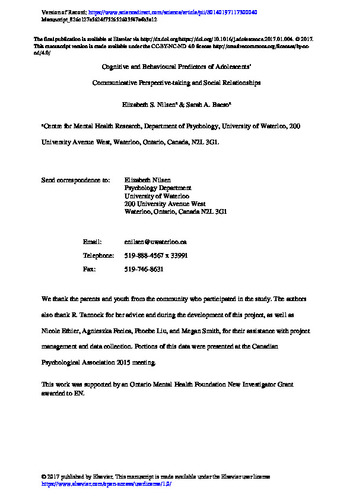| dc.contributor.author | Nilsen, Elizabeth S. | |
| dc.contributor.author | Bacso, Sarah A. | |
| dc.date.accessioned | 2021-09-21 13:57:15 (GMT) | |
| dc.date.available | 2021-09-21 13:57:15 (GMT) | |
| dc.date.issued | 2017-04-01 | |
| dc.identifier.uri | https://doi.org/10.1016/j.adolescence.2017.01.004 | |
| dc.identifier.uri | http://hdl.handle.net/10012/17452 | |
| dc.description | The final publication is available at Elsevier via http://dx.doi.org/https://doi.org/10.1016/j.adolescence.2017.01.004. © 2017. This manuscript version is made available under the CC-BY-NC-ND 4.0 license http://creativecommons.org/licenses/by-nc-nd/4.0/ | en |
| dc.description.abstract | Given the pivotal role that social interactions play for adolescents' well-being, understanding the factors that influence communication is key. The present study examined relations between adolescents' communicative perspective-taking, executive function skills, and ADHD traits and explored the role communicative perspective-taking plays in peer relations. Data was collected from a community sample of 15 to 19-years-olds (N = 46) in Waterloo, Canada. Two communicative perspective-taking tasks required participants to infer speakers' communicative intentions. A battery of tasks assessed adolescents' working memory and inhibitory control. Elevated ADHD traits were associated with weaker working memory, inhibitory control, and communicative perspective-taking. Working memory was the strongest predictor of communicative perspective-taking. Highlighting the importance of communicative perspective-taking for social interactions, adolescents with weaker skills in this area reported worse peer relations. Findings underscore the importance of communicative perspective-taking for adolescents' social relations and have relevance for understanding the social difficulties faced by adolescents with elevated ADHD traits. | en |
| dc.language.iso | en | en |
| dc.publisher | Elsevier | en |
| dc.relation.ispartofseries | Journal of Adolescence; | |
| dc.rights | Attribution-NonCommercial-NoDerivatives 4.0 International | * |
| dc.rights.uri | http://creativecommons.org/licenses/by-nc-nd/4.0/ | * |
| dc.subject | communicative perspective-taking | en |
| dc.subject | ADHD | en |
| dc.subject | executive functioning | en |
| dc.subject | working memory | en |
| dc.subject | adolescence | en |
| dc.subject | communication | en |
| dc.title | Cognitive and behavioural predictors of adolescents' communicative perspective-taking and social relationships | en |
| dc.type | Article | en |
| dcterms.bibliographicCitation | Nilsen, E. S., & Bacso, S. (2017). Cognitive and behavioural predictors of adolescents’ communicative perspective-taking and social relationships. Journal of Adolescence, 56, 52-63. https://doi.org/10.1016/j.adolescence.2017.01.00 | en |
| uws.contributor.affiliation1 | Faculty of Arts | en |
| uws.contributor.affiliation2 | Psychology | en |
| uws.typeOfResource | Text | en |
| uws.peerReviewStatus | Reviewed | en |
| uws.scholarLevel | Faculty | en |


